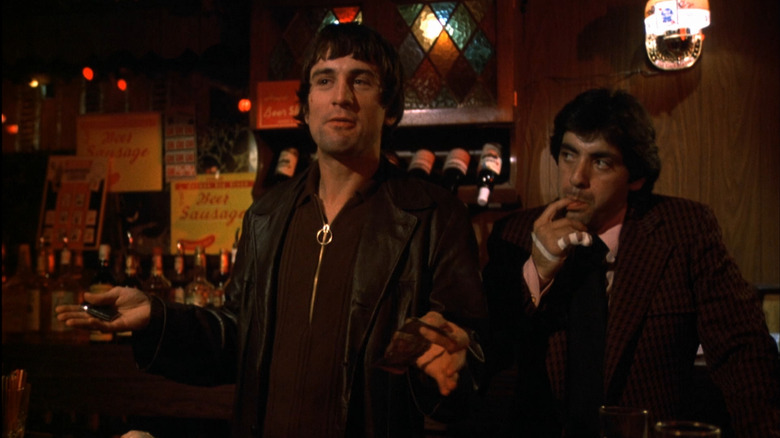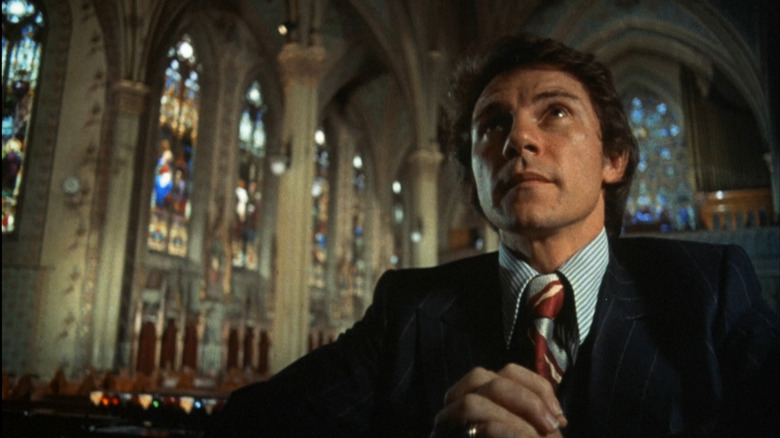Martin Scorsese Paid The Real Mob For One Of His First Movies
There are certain chunks of a film's production budget that are either unexpected or clandestinely factored into the final numbers. When it comes to the latter, you've probably heard tales of films made during the 1970s and 1980s having a cocaine budget. Some films absolutely did. In a 2011 interview with Reuters, Dennis Quaid, a recovering cocaine addict himself, revealed that the expense of the peppy powder got hidden as petty cash. "People would make deals," he explained. "Instead of having a cocktail, you'd have a line."
Given that cocaine is just as illegal in the United States today as it was a half-century ago, it probably won't surprise you to learn that filmmakers have struck all kinds of not-quite-on-the-level deals to get their movies made. I mean, it shouldn't surprise you. Shady bookkeeping and under-the-table payments are the cornerstone of the so-called legitimate business world. And now that the United States government is a cesspool of corruption that's getting more fetid by the day, it feels like getting over is the only way to get by.
Mob rules are the new normal, which, to some degree, has sapped films like "The Godfather," "Goodfellas," and "Deep Cover" of their illicit charge. We're all subject to offers we feel we can't refuse. How do you deal with people who open negotiations with "F*** you, pay me?" Martin Scorsese learned this the hard way while he was shooting his personal favorite of the movies he's made, "Mean Streets."
Martin Scorsese had to pay for the pleasure of shooting Mean Streets in Little Italy
During a 2024 Q&A with hip-hop star Nas at a 50th anniversary screening of "Mean Streets," Scorsese discussed the lengths to which he had to go to get approval to shoot the film in the Little Italy neighborhood of his youth. Interestingly, he only filmed for a week or so in New York City on "Mean Streets." For the most part, Scorsese filmed the interiors and some of the exteriors in Los Angeles. He probably could've shot the whole movie there, but the NYC native had to get a flavor of home into his movie. And this cost him.
According to Scorsese, he wanted to film a particular hallway in a building on Mulberry Street in Little Italy. Scorsese was a kid from the old neighborhood, but the connected guy who owned the building made it painfully plain the filmmaker was not going to get a hometown discount. Scorsese's father attempted to broker a compromise, but he couldn't make inroads. "[The building owner] goes, 'What? He makes money on this. You make a movie, he'll go away. We're still here. This is what it's gonna cost,'" Scorsese explained. "There was no romantic sticking together."
Scorsese had to pay to play. Fortunately, a filmmaker familiar with this palm-greasing rodeo stepped in to help the up-and-coming director. "You paid The Sentinel Society," Scorsese continued. "Francis Coppola gave us $5,000 for that because you couldn't shoot in the festival, because we had to contribute to the San Gennaro Society. As soon as we sold the picture I gave him the money back. It was great."
I would not say "Mean Streets" (which launched Robert De Niro's career) is a film for the Little Italy tourism board, but having rented an apartment on Grand and Mott for a year, I can assure you that Scorsese got his money's worth from that brief period of shooting on his home turf.

